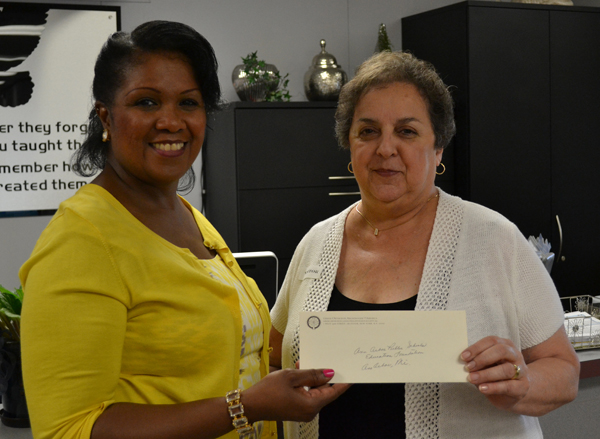
By Tara Cavanaugh
Thanks to a grant from the Greek Women’s Philoptochos Society, autistic students will have access to iPads during the school day.
The society gave $7,000 to the Ann Arbor Public Schools’ Student Intervention and Support Services last month.
Deborah Deja, a special education teacher at Forsythe Middle School, borrowed iPads last year to work with her autistic students. She said she used the iPads during center time to help teach math, money, reading, safety and writing.
“If you can have something so motivating as an iPad at your centers, it makes the kids want to go to that center and want to work,” she said.
“Technology is just one of the wonderful gateways to entering into these kids’ systems,” said Pat Rushing, the district’s autism coordinator. “They love it.”
The iPad, which can feel like a toy, can be a more fun source of the drill-and-practice that students tend to dread doing with a teacher.
“Most of them have ADHD, so it’s tough for them to sit and listen, but using those iPads they’ll sit and listen to a story and they’ll work on their comprehension,” Deja said. “The words are highlighted as the story’s being read, so they’re also working on sight vocabulary and reading fluency.”
Deja, who also a speech pathologist, is particularly excited about an app called “Proloquo2go.” She says the app can provide critical language development skills at a fraction of the cost of previous communication devices.
“For speech and language pathologists, it’s a huge breakthrough. Administrators used to hate to see (speech pathologists) coming because we could end up costing the school system $10,000, $12,000,” she said.
The iPads can also be used to track individual student progress, Rushing said.
The grant will supply nine special education teachers with one iPad in their self-contained classrooms, which have a maximum of five students. The grant will also pay for cases, apps and some training classes.
The grant application requested $4,900 but the Philoptochos Society offered $7,000. Rushing thanks Margaret Yates from the society who brought the grant to the district’s attention, and Chris Barry, the AAPS grants coordinator, for assembling the application quickly.
Deja is also grateful. “Thank you!” she said. “It makes a huge difference in the life of students with learning exceptions. It truly does.”
Related stories


Grant writing at work in Ann Arbor Public Schools. Fabulous! One thing I would also add is that the iPad and other assistive technologies can be very motivating for children with autism and other special needs. iOS devices create a multi-sensory learning opportunity for differently-abled students. It is so much more than a toy and really is not a toy at all…it is UDL at work or Universal Design for Learning: meaning there is a way to use this tool for all learners–no matter what their grade level or ability may be. For all our learners in Ann Arbor Public Schools, “There is an app for that!”
An outstanding share! I’ve just forwarded this onto a co-worker who had been doing a little homework on this. And he actually bought me lunch because I discovered it for him… lol. So let me reword this…. Thank YOU for the meal!! But yeah, thanks for spending the time to talk about this matter here on your site.